About 10 years ago when I began fostering Zoe, an 85-pound deaf American bulldog, I quickly learned that where I saw a lovable companion, others saw dangerous risk. “How can you have a dog like that?” a passerby yelled at me during one of our first walks. “They kill people!”
As the man darted away, tears flooded my cheeks. How could he say such a thing about my precious Z? Something told me mental illness wasn’t to blame.
I began researching and learned that views like his derive from damaging myths that land countless dogs in the bully-breed family in the streets, shelters, the pound or worse. A professional suggested that I keep a distance from untrained, off-leash dogs. If one leapt or bit at Zoe and she responded in defense, Zoe would be blamed, I was told—even if only she were injured. She may also be blamed for injuries she had no involvement with and be prohibited by some landlords’ and home sellers’ properties. It seemed unfathomable, yet I could see where the myths and cruelty derived from. Sadly, too few people question them, letting ignorance they aren’t even aware they have guide their beliefs.
Around the same time, I shared all of this with my friend V, who replied, “You think that’s tough? Try having a black son.”
Huh? Naïveté kept me from understanding the correlation at first.
Then it hit me me: discrimination. V and I had been friends for over a year and I obviously knew she was black. Why hadn’t I wondered about her experience with racism before?

“It happens all the time,” she said when I inquired—it referring to the countless ways she and her family had been discriminated against over the years. Her brother, an accomplished writer who did his best thinking while moving, was stopped routinely by cops during his evening strolls, even in nice areas of LA. So common, he’d accepted suspicion from local authorities as “normal,” and hadn’t even told V about it until he arrived home one night stunned because it hadn’t happened.
Didn’t that make him angry? I asked. Of course it did, said V. It angered her, too. But heated words had only gotten her black friends in trouble, landing one in jail overnight after he was pulled over for no apparent reason—and not for the first time. So instead, V’s husband did his best to appear gentle and calm when policemen approached, smiled genuinely and asked permission before reaching into his pocket for his phone or wallet; he didn’t want anyone to assume that he was retrieving a weapon.
Then V told me that she and her husband were trying to get pregnant. Here I was, worried about how people might perceive my dog while V was concerned about the potential fate of her not-yet-convieved children. I can only imagine that struggle.
All of this was before 2012, when Trayvon Martin, an unarmed black teen was shot and killed by a neighborhood watch coordinator who was later acquitted, and before Michael Brown and Eric Garner lost their lives similarly. Before Ferguson.
♥
In July at BlogHer, I attended a phenomenal panel on race and gender. As the seven female panelists of varied race and sexual orientation discussed white privilege, I wondered how I could better use mine. Being white, I used to feel I shouldn’t speak up on racism—that that microphone belonged to women and men of color. But recognizing discrimination and not partaking in it no longer seem like enough, particularly when I hear others speak from a place of fear and ignorance.
We can all use whatever skills and platforms we have to help raise awareness and carry on the vital conversations so many are finally having on racism. That’s why I was so grateful to have A’Driane Nieves on my show yesterday—without whom I may not have had the courage to approach this topic. The brilliant writer, artist and mother of three beautiful black sons inspires many through her blog and social media posts. Her 2014 BlogHer Voices of the Year-winning piece, America’s Not Here for Us, prompted by her son asking her if black people remain slaves, moved me to tears.
Regardless of how you feel about #BlackLivesMatter, I hope you’ll take the time to really listen to A’Driane and other black voices on the movement’s importance. Process their words, their stories. Understand that it isn’t about devaluing other races, but recognizing and resolving devastating conflicts that have been so deeply engrained in our culture that countless are blind to them. If you feel defensive, ask yourself why; is it possible you’re not seeing the full story? That your perceptions are limited to your own experience? If you agree that #BlackLivesMatter, speak up. If you’re not sure what to say, support others who do. Life is too short and precious not to.
To listen to my interview with A’Driane, visit this link on iTunes — it starts about halfway in. I’ll share more on the first half, including my chat with celebrity dentist Dr. Nicholas Toscano and his role in aiding victims of hate crime, in another post.
Oral Hygiene, Domestic Abuse & Racism on Girl Boner Radio

How do you use your privilege? How has racism affected you? What’s opened your eyes to its existence? As always, I welcome your respectful thoughts. ♥
Once again, a thoughtful and thought-provoking interview, August. The interview with A’driane Nieves is inspired, truly. By that, I mean both of you are sensitive but specific in discussing what #BlackLivesMatter is really about. This interview makes it quite clear what is happening to black Americans. Is is unconscionable.
I am glad to know of Nieves’ blog–thank you–she is one courageous woman. I appreciate having your forum (blog and #GirlBoner Radio) and her blog as resources. I know there are ways I can help.
Great job, August, and thank you.
Karen
Thanks so much for listening, Karen! I’m so glad it struck you, and absolutely agree; unconscionable is the perfect word. Enjoy A’Driane’s blog — I suspect you will!
I’ve actually lost friends over this issue since they were racist. It makes me sick. We are all judged negatively at times by looks, what we wear, etc., and no one likes it, so why do it to others?
I agree, Susie — and so many people are blind to their own racist beliefs, which is really scary. Thanks for your heart!
It is weird. I’m with Susie… why the judging? Why the bullying, why the hatred? If people only would take the time to enjoy the process of KNOWING a person, finding out what’s behind the face – or looks… they would be fascinated very often – and even more, they would be surprised and delighted. And we had more FRIENDS in this world.
So true, Raani. The issues are all so deep and complex. I read an article, I believe on AwesomeLuvvie.com, where the author explained how racism has been built into America’s DNA. Found that so brilliant.
There’s a political element that hurts the credibility of this movement’s leaders. There are also some provable lies being used as talking points. I was a detective for 30 years in a predominantly African-American community. There was not a permanent atmosphere like this between the police and the average citizen living. Events and protests occurred, but law abiding people were treated fairly, while criminals were arrested. As I said, I was there. I saw it. And I made many friends.